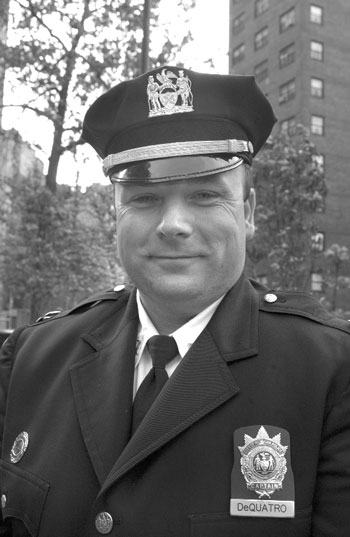By Albert Amateau
Captain Dennis De Quatro, appointed commanding officer of the 10th Precinct on Sept. 24, has his work cut out for him. Crime statistics in the precinct rose 49.4 percent over the past year, counter to the continuing downward trend citywide.
“It’s my responsibility now and I’ll give it 100 percent seven days a week,” said the new C.O. of the precinct covering Chelsea and part of Hell’s Kitchen.
Seven days is no exaggeration, according to Michael Patrillo, community affairs officer of the 10th Precinct. “He’s around here 14 hours a day,” said Patrillo, referring to the new C.O.
De Quatro, a police officer for more than 12 years who had served in the Bronx and northern Manhattan, was the executive officer of the Midtown South Precinct before coming to the stationhouse on W. 20th St. He replaced Captain Gabrielle Sbano, who led the 10th Precinct from November 2002 until September 2003 when she became commanding officer of the Surface Transportation Division in Manhattan.
De Quatro attributes part of the jump in crime statistics to the fact that Chelsea has had a dramatic increase in population recently and has more large nightclubs than any other district in the city.
“We’ve had about 2,500 more apartment units in the past two years — new development on 23rd and 42nd Sts., at 20th St. and 10th Ave. and one under construction on 20th St. and Eighth Ave. We also have some of the largest clubs in the city and four new ones are coming on W. 27th St. between 10th and 11th Avenues. That brings large numbers of people walking through the district,” De Quatro said.
Among the new clubs to open soon on W. 27th St., CroBar will have a capacity of 3,000 patrons and Spirit will hold just under 2,000, according to De Quatro.
“We saw that a majority of the assaults were driven by assaults in clubs,” said De Quatro. “They’ve stabilized in the past couple of weeks to manageable numbers. Club-related assaults have dropped off considerably,” he added.
The precinct’s Community Response Team, essentially a cabaret unit, is doing a “tremendous job,” said De Quatro. “We’ve taken a hard look at clubs and it’s starting to have an effect.”
Last month, the 10th Precinct provided a Community Board 4 committee with a report on Sessa, a club at 208 W. 23rd St. on the ground floor and basement of a high-rise residential building. Between Dec. 16, 2002, and Oct. 19, 2003, there were 33 complaints to police about the club, with one rape, 12 assaults, seven petit larcenies, four harassment cases, three grand larcenies and a robbery among the offenses.
The increase in 10th Precinct crime came to light in June when Commissioner Ray Kelly announced an inquiry into whether the 2001 and 2002 statistics for the precinct were illegally manipulated to show a 7.2 percent reduction in felonies instead of a 15.7 percent increase. Former 10th Precinct C.O. Captain Dominic Gentile, who was transferred to Brooklyn in 2002, and retired Sergeant Bruce Golden, who prepared Gentile’s statistics, are still under investigation.
De Quatro declined to comment on the past. “I can only deal with what I have in front of me now,” he said.
“I’ve focused on clubs, some large and some small, that have not paid proper attention to our concerns,” De Quatro said. “I’m especially concerned with violent crimes — assaults and robberies — where individual persons are the victims,” he added.
In a precinct that includes perhaps the largest gay population in the city, the Gay and Lesbian Anti-Violence Project is an important resource, De Quatro said. “They do a wonderful job,” he observed.
The precinct, which has 145 police officers and supervisory officers, includes a Conditions Unit team that addresses quality of life issues. “Everything from squeegee men, beer drinkers in public, trespassers, whatever issue is raised by the community or observed by us,” De Quatro added.
The new 10th Precinct C.O. also meets regularly and coordinates enforcement with Captain Edward F. Britton, new commanding officer of Police Service Area 4, which covers the New York City Housing Authority projects in the area, including the Robert Fulton Houses on Ninth Ave. between 16th and 18th Sts., and the Elliott Chelsea Houses between Ninth and 10th Aves. from 25th to 27th Sts.
“We have a special group working in the areas around the Fulton and Chelsea houses,” said De Quatro, “about half of the complaints there are related to narcotics and crimes associated with narcotics.” The precinct’s enforcement effort in the Fulton and Elliott Chelsea houses also involves a working relationship with the Hudson Guild and a recent meeting with Janice McGuire, executive director of the Guild. “We have two youth officers who work with the high schools and elementary schools in the precinct.” De Quatro said. “They’re developing lines of communication and trust between kids and police,” he said.
The Auxiliary Police, unarmed civilians in police uniform, are also an important resource, De Quatro said. The 10th Precinct Auxiliary includes 41 community residents who assist officers and serve as the “eyes and ears” of the precinct.
Law enforcement involves public education, especially around holiday time. “We’ve scheduled crime prevention seminars, mostly to remind people about the obvious,” De Quatro said, “Like it’s not a good idea to leave packages in the back seat of your car and it’s dangerous to invite people home who you’ve just met in a bar.”
The precinct has also received additional personnel from the Manhattan South Borough Patrol Command for the holiday season, De Quatro said. Moreover, precinct cops who are not normally assigned to enforcement duty are patrolling the neighborhood for the next few weeks.




































